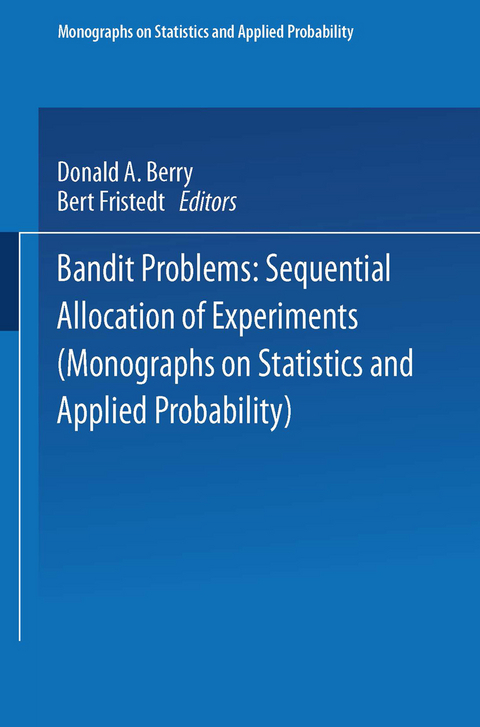
Bandit problems
Sequential Allocation of Experiments
Seiten
2013
|
Softcover reprint of the original 1st ed. 1985
Springer (Verlag)
978-94-015-3713-1 (ISBN)
Springer (Verlag)
978-94-015-3713-1 (ISBN)
Our purpose in writing this monograph is to give a comprehensive treatment of the subject. We define bandit problems and give the necessary foundations in Chapter 2. We give proofs unless they are very easy or the result is not used in the sequel. All results given have been incorporated into our style and notation.
Our purpose in writing this monograph is to give a comprehensive treatment of the subject. We define bandit problems and give the necessary foundations in Chapter 2. Many of the important results that have appeared in the literature are presented in later chapters; these are interspersed with new results. We give proofs unless they are very easy or the result is not used in the sequel. We have simplified a number of arguments so many of the proofs given tend to be conceptual rather than calculational. All results given have been incorporated into our style and notation. The exposition is aimed at a variety of types of readers. Bandit problems and the associated mathematical and technical issues are developed from first principles. Since we have tried to be comprehens ive the mathematical level is sometimes advanced; for example, we use measure-theoretic notions freely in Chapter 2. But the mathema tically uninitiated reader can easily sidestep such discussion when it occurs in Chapter 2 and elsewhere. We have tried to appeal to graduate students and professionals in engineering, biometry, econ omics, management science, and operations research, as well as those in mathematics and statistics. The monograph could serve as a reference for professionals or as a telA in a semester or year-long graduate level course.
Our purpose in writing this monograph is to give a comprehensive treatment of the subject. We define bandit problems and give the necessary foundations in Chapter 2. Many of the important results that have appeared in the literature are presented in later chapters; these are interspersed with new results. We give proofs unless they are very easy or the result is not used in the sequel. We have simplified a number of arguments so many of the proofs given tend to be conceptual rather than calculational. All results given have been incorporated into our style and notation. The exposition is aimed at a variety of types of readers. Bandit problems and the associated mathematical and technical issues are developed from first principles. Since we have tried to be comprehens ive the mathematical level is sometimes advanced; for example, we use measure-theoretic notions freely in Chapter 2. But the mathema tically uninitiated reader can easily sidestep such discussion when it occurs in Chapter 2 and elsewhere. We have tried to appeal to graduate students and professionals in engineering, biometry, econ omics, management science, and operations research, as well as those in mathematics and statistics. The monograph could serve as a reference for professionals or as a telA in a semester or year-long graduate level course.
1 Introduction.- 2 Notation and preliminaries.- 3 The discount sequence.- 4 Independent Bernoulli arms.- 5 Two arms, one arm known.- 6 Many independent arms; geometric discounting.- 7 Two independent Bernoulli arms; uniform discounting.- 8 Continuous-time bandits.- 9 Minimax approach.- Annotated bibliography.- Name Index.- Symbol Index.
| Reihe/Serie | Monographs on Statistics and Applied Probability |
|---|---|
| Zusatzinfo | VIII, 275 p. |
| Verlagsort | Dordrecht |
| Sprache | englisch |
| Maße | 155 x 235 mm |
| Themenwelt | Naturwissenschaften ► Physik / Astronomie ► Allgemeines / Lexika |
| ISBN-10 | 94-015-3713-5 / 9401537135 |
| ISBN-13 | 978-94-015-3713-1 / 9789401537131 |
| Zustand | Neuware |
| Haben Sie eine Frage zum Produkt? |
Mehr entdecken
aus dem Bereich
aus dem Bereich
Band 1: Mechanik und Thermodynamik
Buch | Softcover (2022)
Wiley-VCH (Verlag)
39,90 €
für Studierende der Naturwissenschaften und Technik
Buch | Hardcover (2024)
Springer Spektrum (Verlag)
79,99 €


